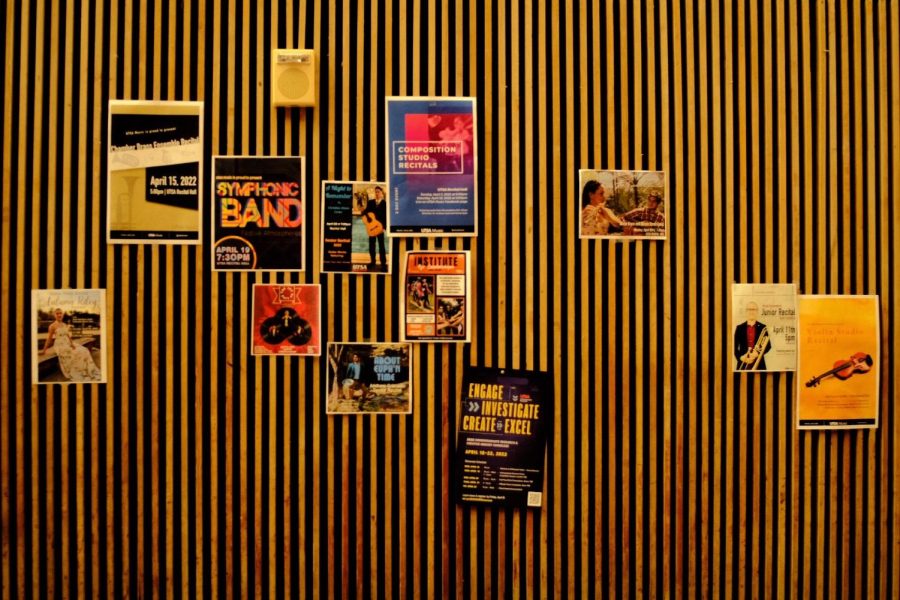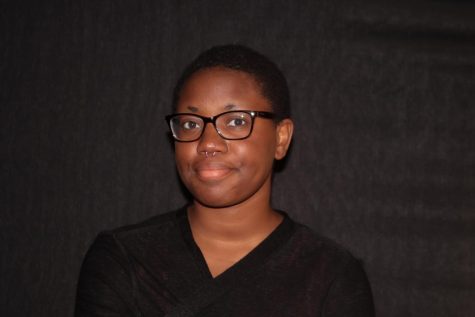UTSA art and music majors dissatisfied with their departments’ event marketing part II
Students, professors and admin discuss the current state of the departments’ marketing practices and services
April 26, 2022
As a student attending university, being heard can be a way of measuring how much your university cares about your success. It plays an essential role in bettering a system that has been put into place to help people; instead, the system passes them by. Throughout the development of this story, there were themes of frustration directed toward the communication between the school, the students and the UTSA Arts Department.
“It’s like talking to a wall,” arts major Abrianna Gill said.
Gill expressed that tasks such as registering for classes and communication with the administration is a hassle.
“Unless you really advocate for yourself, nothing’s gonna happen,” Gill said. “Sometimes you have to email [admin] 15 to 20 times before they respond.”
She recalled that it started to become a problem during the pandemic and has not ceased since then.
Fellow arts major, Savannah, acknowledged how this pattern of being ignored by their department is not a new ordeal, but in fact, is widely seen in their daily lives as artists and students.
“I feel . . . a lot of people don’t take artists seriously, especially . . . when [there are] a lot of other majors that are on here like pre-law and even science majors. I feel we’re not taken seriously because it’s not considered . . . a foundational thing [in] society,” Savannah said. “But for us, this is our lives and our careers. So it’s really frustrating.”
Many students rallied around the statements and even mentioned how when it comes to people covering their events, they have yet to interact with the media at all.
“I feel like at this point we are numb to it,” Gill said. “Because it’s been going on for so long.”
Senior Administrator of the Arts Department Victor Gurrero said he is “one-hundred percent supportive of the students,” but did not comment further on the subject.
As for the students in the department, they become less prompted to participate in the events hosted by the arts department after incentives to support their peers disappears.
Sophomore performance major Keith Deene and other music students explained that art students receive credits for attending concerts, but after everyone has filled their requirements for the year they are no longer showing up for these events.
“For the concert group at [the] convocation, there were like twenty people because everybody already has their attendants,” Deene said. “So, now everybody [is] doing their senior recitals, and everybody has concert credits and [they’re like] ‘oh I’m not gonna go’,” Deene said.
He and the other students mentioned that some people just scan the QR code to record attendance and leave.
Professor Juan Mora highlighted his experience with trying to get his students to go to events and being met with a lack of participation.
“I tell our students, there are shows every weekend,” Mora said. “I tell them, ‘this is where you can find our shows’ and I gave them locations.”
He shares that it is his expectation for students to go and support their peers, but it might just be them not wanting to go or other obstacles that might be holding them back from going.
As this issue unravels, responsibility does not fall easily onto one side of the court.
“They just have to ask,” senior lecturer Dr. Jordan Laine Howell said.
Dr. Howell went into detail about the different things students can utilize to promote themselves and their performances through the staff including promotional materials like graphics for posts on social media, posters, banners and even just a place to print their flyers.
“Some of the [responsibility] has to be on the students to do a little bit of the leg work, [but] not all of it,” Howell said.
She mentions the department’s magazine, The Cadenza, which is used to advertise the Music Department to the many people associated with the university. Howell mentions the department’s desire to do more promotions, but it ultimately becomes a “balancing act” with the budget granted and all of the other mail-outs that are pushed by the department.
“[And us], the conductors and directors of the ensemble who put in just as much work, if not more, and we want people there too,” Howell said.
She continues on to say that she too witnesses the lack of attendance at voice recitals.
“These are posters that are up, these are their friends, and they aren’t even coming to those,” Howell said.
With faculty noticing the significant lack of participation, the need for a solution is a weight on their shoulders. New staff member and Marketing Coordinator, Rolando Ramon, might be the answer.
“Because for a whole year, we were streaming … once we came [back to] in-person events, obviously, attendance wasn’t as great as before, because people were still getting used to everything,” Ramon said. “And so [to] kind of help . . .mitigate that, they brought me on board to basically help with marketing events . . . with recruiting ads to bring in new prospective students into the university for the music department.”
Ramon and his team of students work on paper media, social media, graphic designs and more for the department. He explains that since it is a new position, there are still lots of undefined procedures and guidelines for the students.
“Definitely a learning process as well. That’s something I’m hoping to get up and running completely, . . .by next semester,” Ramon said. “Students can email me, reach out to me, or send me graphics or send me ideas for graphics. That’s one of the main things I want to emphasize during my time here.”
He also expressed his aspirations to go further in the department by establishing a brand and developing a more efficient mode of communication with the students.
“That’s another thing we’re trying to do … I made a form that we’ve been using to get marketing requests from people,” Ramon said. “The hope [is to] streamline the process, make it a little bit easier for people to get this request to us in a timely manner.”
Other initiatives he is working on include: getting more use out of social media platforms and their features, such as Instagram stories that get approximately 300 views from students, staff and parents. He is looking at how online participation is cutting into the in-person viewership.
“I’m working to figure out how to better balance and get the word out for all these concerts, . . .and making it fair for everybody,” Ramon said. “And so you know, there’s just there’s many ways that we can get it out. And my plan is basically to utilize all of those ways.”
Ramon continued to sympathize with the students, expressing how there is an overwhelming amount of concerts happening and praises the Musicians of Business (MOB) for the work that they have done for the organization.
“No one should be forced to go to these events, and sometimes you can’t make it for whatever reason, that’s just life,” Ramon said. “But I think when it comes to making . . . a living, you also need to be thinking about promotions and all that. And so I think it’s great that we offer [MOB] here at [the] university because it’s a valuable skill that will help you make your craft into a legitimate living.”
He hopes that event turnouts and a smoother running system will be set up by the fall 2022 semester. In the future, he plans to continue building up the department’s brand.
“I think a very, very strong campus culture and the student culture…that’s one of the things that drives people, that makes me want to come here,” Ramon said. “Unity in an organization [and] participation. I think that’s exactly what we need here to solidify UTSA as a brand and power university.”
And for the students of UTSA, he hopes to build a relationship where he can help the music students work through their marketing issues.
“I hear you, and I’m with you, I’ve been there,” Ramon said. “For years, I’ve been through all of this, so I know exactly what it is that you’re going through. And I want you to know that this means more to me than just a paycheck. This is my home, you know, once a Roadrunner, forever [a] Roadrunner. And so, I empathize with you, and I’m doing everything [and] I will be doing everything I can to make sure that we are getting people in the recital hall and you are having the recital audience that you deserve. That goes for all UTSA students and the faculty and all the ensembles. I’m committed to this.”












